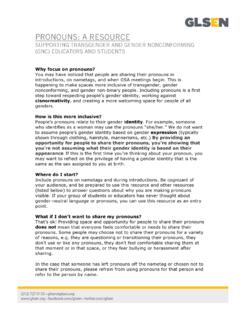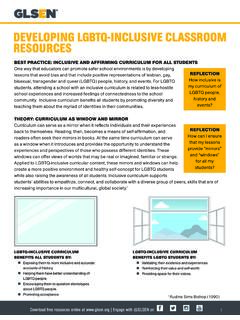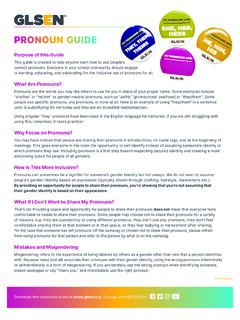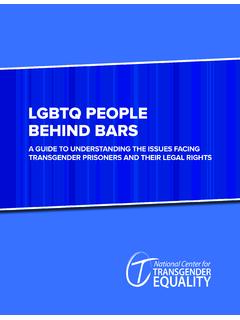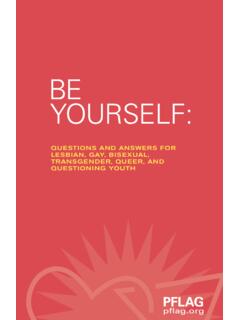Transcription of KNOW YOUR RIGHTS A Guide for Transgender and Gender ...
1 KNOW YOUR RIGHTS . KNOW YOUR RIGHTS . A Guide for Transgender and Gender Nonconforming Students KNOW YOUR RIGHTS : A Guide FOR Transgender AND. Gender NONCONFORMING STUDENTS. You have the right to be safe and to be yourself at school. That is why the American Civil Liberties Union (ACLU). and GLSEN have put together this Guide to inform you of your RIGHTS . THE BASICS. Your Right to Be Safe in School Public schools are legally required to protect all students from harassment. Under the Constitution, schools must address any harassment against you the same way they would for any other student. Under a federal law called Title IX that bans sex discrimination in schools that receive federal funding, public schools can't ignore discrimination or harassment based on Gender identity and expression.
2 Many states also ban schools from discriminating based on Gender identity and expression. However, for Title IX to apply, the harassment has to be severe, and the school has to have been told about it and then have not done enough to address it. For this reason, it is very important to report harassment every time it happens if you feel safe doing so. If you're being harassed or bullied or see it happening to someone else, you should report it immediately to an administrator, counselor, or other school official. They have a legal responsibility to respond. Your Right to Be Yourself in School Everyone has the right to be themselves in school . including you! Public schools are required to respect your Gender identity and expression. What you say: The First Amendment to the Constitution gives all public school students the right to free speech and expression.
3 This means you can talk and write about who you are and about issues relating to Gender identity, Gender expression, and being Transgender . Your right to free speech doesn't mean that you can say whatever you want at any time; your speech is not protected if it disrupts class time, is meant 2. to encourage other students to break school rules, is obscene, or is a lie about someone and could damage their reputation. Your school can put some limits on where and when certain kinds of speech are allowed, but those limits must be reasonable and apply to everyone equally. What you wear: Your Gender expression is protected by the Constitution, Title IX, and any state or local law that bans discrimination based on Gender identity. This right to free expression includes your clothes.
4 As long as what you wear would be appropriate if worn by other students, such as a skirt or a tuxedo, then you should be able to wear it if you're Transgender or Gender nonconforming. This also applies if the garment isn't something people usually associate with your Gender . School dress codes have to treat all students equally. Prom and other school events: If you're a trans girl, can you run for homecoming queen? If you're a trans boy, can you wear a tuxedo to prom? Yes! The First Amendment and your right to equal protection grant you the right to express yourself at prom, homecoming, or similar school events. You're also protected in your choice of prom date by any state or local law that prohibits discrimination based on sexual orientation and Gender identity. Disruption: Schools often use disruption as a reason to illegally censor students because the Supreme Court ruled that schools can only censor student expression if it disrupts educational time.
5 But that often turns out to be a flimsy excuse that doesn't hold up in court. Under the law, disruption only happens when students are prevented from the opportunity to learn. For example, interrupting a teacher in class to give a political speech or holding a protest where you block access to a classroom would actually keep other students from learning. But simply wearing clothes that are 3. appropriate for your Gender identity or talking about LGBT issues between classes or at lunchtime wouldn't keep anyone else from getting an education and are therefore not disruptions. The fact that someone else might not like how you express yourself doesn't mean you're keeping other students from learning. And if someone gets upset or makes a scene about your Gender identity or expression, the school cannot legally punish YOU for someone else's discomfort or bad behavior.
6 So if your school censors you and says it's because you're disruptive, don't just take their word for it. You Have the Right to Be Trans or Transition at School Your right to be yourself in school includes the right to be Transgender or to transition your Gender in school. Unfortunately, there aren't yet clear rules in most places about how schools should accommodate students when they transition. There are often many obstacles to deal with, including your name and what pronouns to use when talking about you, restroom and locker room accessibility, and how official records classify you. We strongly suggest calling the ACLU or GLSEN to help you chart this course, and check out GLSEN and NCTE's model school policy for trans and Gender nonconforming students at Transgender -model-district-policy.
7 How to talk with your school about being Transgender or transitioning: The more support you have in talking to your school about being Transgender , the better. If you can, involve your parents or guardians and your doctor, and reach out to supportive teachers and other staff. Explain to the school that it is legally obligated to create a safe learning environment for all students, including you, and that you have a constitutional right to express who you are in school. If your state or city bans discrimination in schools based on Gender identity, make sure your school knows about the law. 4. What should you ask your school to do? Your school should assess your needs on an individual basis, and you and your school should create a plan that works for you. In all cases, your school's goals should be to ensure your safety and support your emotional well-being so that you can learn and achieve your full potential.
8 They can do this by acting to prevent harassment or bullying, making accommodations with respect to restrooms and lockers, and protecting your privacy by not revealing that you are Transgender to others unless you have given them permission to do so. Your school should not be outing you to anyone. Can your school refuse to use your chosen name and pronouns? Schools often claim that they can't honor the names or pronouns that correspond with a student's Gender identity because they can only use students' legal names. This simply isn't true. There is no law that says schools can only use students' legal names. Your legal name probably has to appear on your transcript, but your school can use your chosen name and pronouns on just about everything else: class attendance rosters, your student ID, yearbook, report cards, etc.
9 If you get a legal name change, your school should also update all your official records to match your new legal name. Privacy: Your Transgender status, legal name, and Gender assigned at birth are all confidential information. If your school reveals that information to anyone without your permission, it could be violating federal law. For example, if you talk to the school nurse about your Gender identity, the school has to keep that information private. Don't count on school officials to understand that. If you don't want them revealing your private information to others, tell them very clearly that you want your information kept private and that they shouldn't out you to other students, parents, or anyone else without your consent. 5. Sports: There are many states that allow Transgender high school students to compete in sports in accordance with their Gender identity: California, Colorado, Connecticut, District of Columbia, Florida, Maryland, Massachusetts, Minnesota, Nevada, New Hampshire, Rhode Island, South Dakota, Vermont, Washington, and Wyoming.
10 The remaining states have a variety of eligibility requirements. Some states require that trans students are prescribed hormone therapy in order to participate consistent with their Gender identity, and other states have no guidelines at all. Locker rooms and restrooms: The Department of Education and the Department of Justice both say that Transgender students have a right to use school restrooms and locker rooms that correspond with their Gender identity. However, this is an area of the law that is rapidly evolving and there is still more work to be done. Do you need to get a Gender dysphoria diagnosis to be treated fairly by the school? Students who are Transgender sometimes have an easier time getting accommodations from their schools when they have an official Gender dysphoria diagnosis from a doctor or therapist, especially if that doctor or therapist is willing to write a letter or talk to the school to say that recognizing a student's Gender identity is medically necessary.

